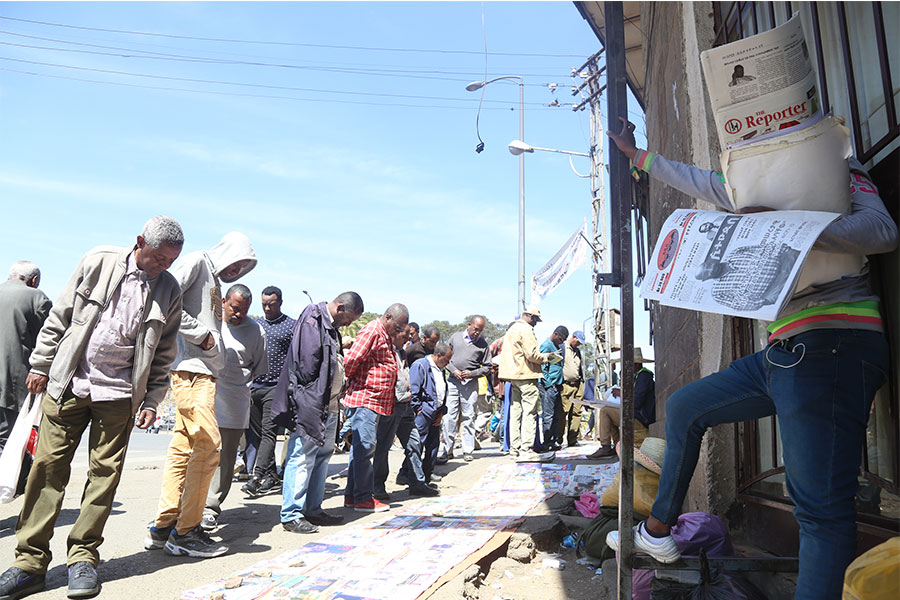
Editorial | Apr 03,2021
May 18 , 2019
By SELAMAWIT MENGESAHA ( FORTUNE STAFF WRITER )
High-level government officials cannot receive gifts or overseas travel offers without getting approval from the Prime Minister, according to a new regulation that is in the making.
Under draft for the past year by the Federal Ethics & Anti-Corruption Commission, the bill outlines a code of conduct and ethical standards that public officials should adhere to. The code of conduct and ethical standards will be the first ever for the country.
The new code of conduct will regulate appointees at the Office of the Prime Minister, ministers, state ministers, the mayors of Addis Abeba and Dire Dawa city administrations and officials at the mayor's office of the two city administrations.
With the new regulation, which is expected to be active within three months, none of the government officials can accept gifts and overseas travel opportunities without the Prime Minister's approval, decide to hire any of their relatives or make procurements from companies with which they have affiliations. They will also be required to register properties they own with the Commission within 45 days of their appointments.
"These all are intended to avoid conflicts of interest that can lead to corruption," said Tesfaye Shambo, director of reform and good governance at the Commission, responding to Fortune.
The grand corruption that has been expanding in the country is the reason for the regulation, according to Tesfaye.
The Corruption Perceptions Index (CPI), released by Transparency International in 2018, placed Ethiopia at 114 out of 180 countries. The report that ranks countries on a scale of zero for highly corrupt to 100 for the least corrupt awarded Ethiopia a score of 34.
Though the Commission was mandated to draft a code of conduct and ethical standards by its establishment proclamation 15 years ago, it never developed one.
"We drafted a bill a couple of years ago," he said, "but it could not be realised, as the officials at that time were unhappy with it and blocked the bill from being legislated."
Financed by the United Nations Development Programme's (UNDP) Governance & Democratic Participation Programme, the bill was drafted by professionals from the Commission and external consultants. The five-year project is a multi-stakeholder programme launched in July 2017 and has been working with the Commission on 11 other ongoing projects.
The first draft of the bill is finalised and is on its final stages to be submitted for deliberation by officials. It is expected to be approved by the Council of Ministers before the end of the current fiscal year, according to Tesfaye.
"The officials are not even aware of the draft," said Tesfaye. "We'll be familiarising them with the bill and its details during the upcoming stakeholders' discussion."
Ameha Mekonnen, a lawyer by profession and the board chairperson of the Ethiopian Human Rights Council, seconded the initiation of the Commission in having a code that will regulate government officials.
"It can be an important part in establishing an inclusive culture of a corruption-free county," he said.
But he believes that the code of conduct and the ethical guidelines cannot be a solution by themselves.
"The Commission also has to work on the institutionalisation and behavioural changes of the officials themselves," he said.
The Commission, along with UNDP, is working to conduct a national survey next July to identify the most corruption-prone institutions and the overall level of corruption in the country.
The third National Corruption Perception Survey, which will be conducted at the nine regional states and the two city administrations, is expected to determine the severity of corruption at a national level, the maximum level of corruption involved and which institutions are highly susceptible to corruption.
Over the past couple of months, public prosecutors have charged dozens of government officials in different institutions with alleged corruption.
The defendants are from the Metals & Engineering Corporation, the Public Procurement & Property Disposal Service, the Pharmaceuticals Fund & Supply Agency, the Ethiopian Business Trading Corporation and the Ethiopian Water Works Construction Enterprise.
PUBLISHED ON
May 18,2019 [ VOL
20 , NO
994]

Editorial | Apr 03,2021

Commentaries | Dec 11,2020

Commentaries | Apr 03,2021

Agenda | Dec 19,2018

Fortune News | Mar 26,2022

Fineline | Nov 30,2019

Commentaries | Jan 31,2021

My Opinion | Aug 07,2021

Viewpoints | Jul 18,2021

My Opinion | Dec 19,2020

Dec 22 , 2024 . By TIZITA SHEWAFERAW
Charged with transforming colossal state-owned enterprises into modern and competitiv...

Aug 18 , 2024 . By AKSAH ITALO
Although predictable Yonas Zerihun's job in the ride-hailing service is not immune to...

Jul 28 , 2024 . By TIZITA SHEWAFERAW
Unhabitual, perhaps too many, Samuel Gebreyohannes, 38, used to occasionally enjoy a couple of beers at breakfast. However, he recently swit...

Jul 13 , 2024 . By AKSAH ITALO
Investors who rely on tractors, trucks, and field vehicles for commuting, transporting commodities, and f...

Jul 5 , 2025
Six years ago, Ethiopia was the darling of international liberal commentators. A year...

Jun 28 , 2025
Meseret Damtie, the assertive auditor general, has never been shy about naming names...

Jun 21 , 2025
A well-worn adage says, “Budget is not destiny, but it is direction.” Examining t...

Jun 14 , 2025
Yet again, the Horn of Africa is bracing for trouble. A region already frayed by wars...